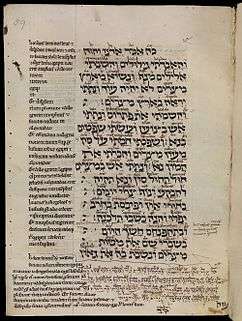Ezekiel 8
| Ezekiel 8 | |
|---|---|
 Book of Ezekiel 30:13–18 in an English manuscript from the early 13th century, MS. Bodl. Or. 62, fol. 59a. A Latin translation appears in the margins with further interlineations above the Hebrew. | |
| Book | Book of Ezekiel |
| Bible part | Old Testament |
| Order in the Bible part | 26 |
| Category | Nevi'im |
Ezekiel 8 is the eighth chapter of the Book of Ezekiel in the Hebrew Bible or the Old Testament of the Christian Bible. This book contains the prophecies spoken by the prophet Ezekiel, and is one of the Books of the Prophets.[1]
Text
- The original text is written in Hebrew language.
- This chapter is divided into 18 verses.
Textual versions
Some most ancient manuscripts containing this chapter in Hebrew language:
- Masoretic Text (10th century)
Ancient translations in Koine Greek:
- Septuagint
- Theodotion version (~AD 180)
Verse 1
- And it came to pass in the sixth year, in the sixth month, on the fifth day of the month,
- as I sat in my house with the elders of Judah sitting before me,
- that the hand of the Lord God fell upon me there.[2]
- "In the sixth year, in the sixth month, on the fifth day of the month": According to the New Oxford Annotated Bible, this day falls on "September 17, 592 BCE."[3]
Verse 5
- Then He said to me, “Son of man, lift your eyes now toward the north.”
- So I lifted my eyes toward the north,
- and there, north of the altar gate,
- was this image of jealousy in the entrance.[4]
Verse 11
- And there stood before them seventy men of the elders of the house of Israel,
- and in their midst stood Jaazaniah the son of Shaphan.
- Each man had a censer in his hand,
- and a thick cloud of incense went up.[8]
- "Jaazaniah" (Hebrew: יאזניהו ya-’ă-zan-yā-hū; "whom Jehovah hears"[9]): the son of Shaphan. If he is indeed the son of Shaphan, the secretary of King Josiah (2 Kings 22), then he has not followed his father's ways.[10]
Verse 14
- So He brought me to the door of the north gate of the Lord’s house;
- and to my dismay,
- "Weeping for Tammuz": an "ancient ritual of Sumerian origin,"[12] "counterpart of Sumerian Dumuzi, the fertility-god associated with shepherding and vegetation".[13] The weeping is to commemorate the death of seasonal fertility, and the cult stresses for the mourning aspect of it.[14] The Phoenicians called it "Adon" (or "Lord"), from where the Greek cult "Adonis" took root.[15]
Verse 16
- So He brought me into the inner court of the Lord’s house; and there, at the door of the temple of the Lord, between the porch and the altar, were about twenty-five men with their backs toward the temple of the Lord and their faces toward the east, and they were worshiping the sun toward the east. (NKJV)[16]
- "Worshipping the sun": This practice in Israel is mentioned in the 2 Kings 23:5,11 and also "evidenced by artifacts."[3]
See also
|
- Related Bible parts: Joel 2, Luke 11, 2 Corinthians 12
Notes and references
- ↑ Theodore Hiebert, et al. 1996. The New Interpreter's Bible: Volume VI. Nashville: Abingdon.
- ↑ Ezekiel 8:1
- 1 2 The New Oxford Annotated Bible with the Apocrypha, Augmented Third Edition, New Revised Standard Version, Indexed. Michael D. Coogan, Marc Brettler, Carol A. Newsom, Editors. Publisher: Oxford University Press, USA; 2007. pp. 1190-1191 Hebrew Bible. ISBN 978-0195288810
- ↑ Ezekiel 8:5
- ↑ Bromiley 1995, p. 574.
- ↑ Brown, Francis; Briggs, Charles A.; Driver, S. R. The Brown-Driver-Briggs Hebrew and English Lexicon. Hendrickson Publishers; Reprint edition (1994). ISBN 978-1565632066. "semel", "qinah".
- ↑ Gesenius, H. W. F. Gesenius' Hebrew and Chaldee Lexicon to the Old Testament Scriptures: Numerically Coded to Strong's Exhaustive Concordance, with an English Index. Samuel Prideaux Tregelles (Translator). Baker Book House; 7th edition. 1979. קִנְאָה
- ↑ Ezekiel 8:11
- ↑ Gesenius, H. W. F. Gesenius' Hebrew and Chaldee Lexicon to the Old Testament Scriptures: Numerically Coded to Strong's Exhaustive Concordance, with an English Index. Samuel Prideaux Tregelles (Translator). Baker Book House; 7th edition. 1979. יַאֲזַנְיָ֨הוּ
- ↑ Joyce 2009, p. 99.
- ↑ Ezekiel 8:14
- ↑ Clements 1996, p. 38.
- ↑ Bromiley 1995, p. 86.
- ↑ Bromiley 1995, p. 87.
- ↑ Bromiley 1995, p. 729.
- ↑ Ezekiel 8:16
Bibliography
- Bromiley, Geoffrey W. (1995). International Standard Bible Encyclopedia: vol. iv, Q-Z. Eerdmans.
- Clements, Ronald E (1996). Ezekiel. Westminster John Knox Press. ISBN 9780664252724.
- Joyce, Paul M. (2009). Ezekiel: A Commentary. Continuum. ISBN 9780567483614.
- Ulrich, Eugene, ed. (2010). The Biblical Qumran Scrolls: Transcriptions and Textual Variants. Brill.
External links
Jewish
Christian
This article is issued from
Wikipedia.
The text is licensed under Creative Commons - Attribution - Sharealike.
Additional terms may apply for the media files.